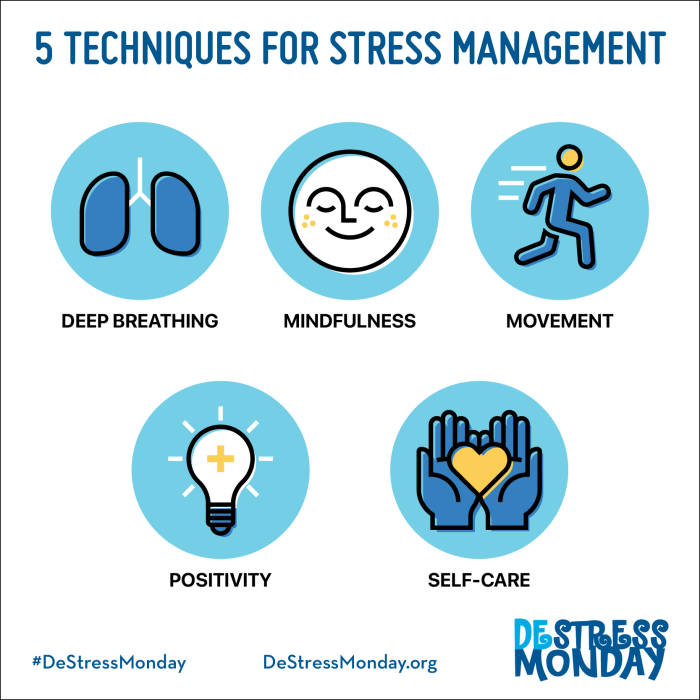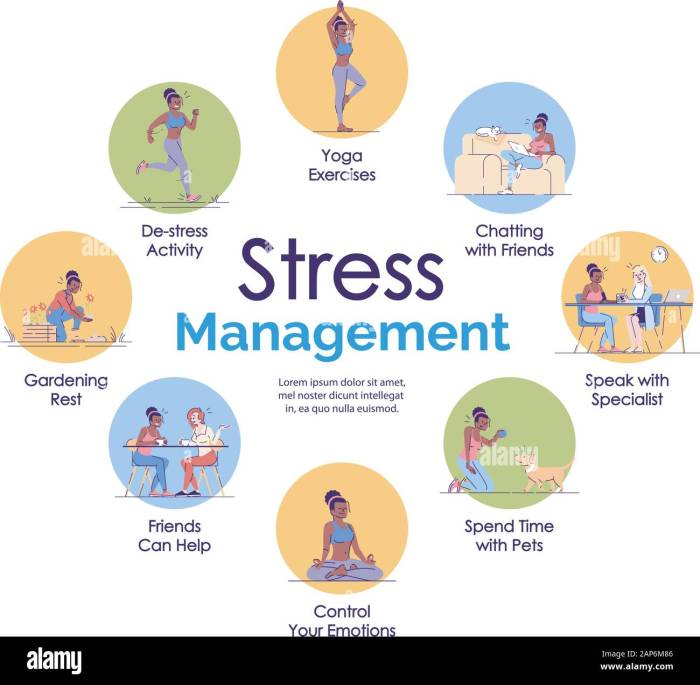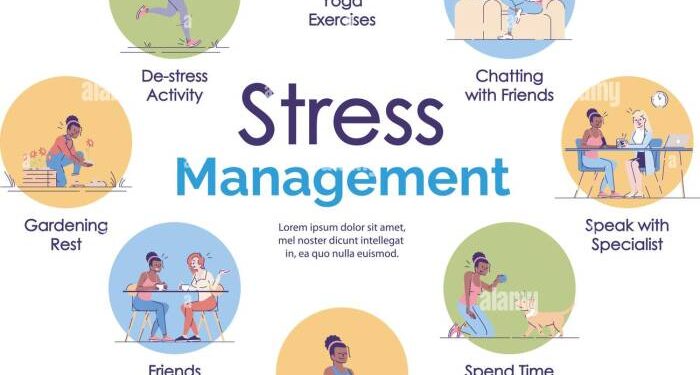Embark on a journey through effective Chronic stress management strategies that work, as we delve into practical solutions to combat stress and improve overall well-being.
Explore the various aspects of managing chronic stress and discover valuable insights to enhance your stress management skills.
Overview of Chronic Stress
Chronic stress is a prolonged state of heightened stress response that can have a detrimental impact on both mental and physical health. Unlike acute stress, which is short-term and typically triggered by a specific event, chronic stress persists over an extended period and can be caused by various factors.Common causes of chronic stress include ongoing work pressures, financial difficulties, relationship problems, health issues, and traumatic experiences.
When left unmanaged, chronic stress can lead to a range of health problems such as anxiety, depression, high blood pressure, heart disease, and weakened immune function.It is crucial to manage chronic stress effectively to prevent long-term negative consequences on overall well-being.
Implementing stress management strategies can help individuals cope with stressors, improve resilience, and maintain a healthy balance in life.
Lifestyle Changes

Making lifestyle modifications can play a significant role in reducing chronic stress. By incorporating healthy habits into your daily routine, you can better manage stress levels and improve overall well-being.
Exercise
Regular physical activity is essential for managing chronic stress. Exercise helps reduce cortisol levels, the stress hormone, and releases endorphins, which are natural mood lifters. Engaging in activities like walking, running, yoga, or dancing can help relieve tension and improve mental clarity.
Aim for at least 30 minutes of moderate exercise most days of the week to experience the stress-relieving benefits.
Healthy Diet
Eating a balanced and nutritious diet can also impact stress levels. Consuming foods rich in vitamins, minerals, and antioxidants can support your body in coping with stress. Include plenty of fruits, vegetables, whole grains, lean proteins, and healthy fats in your meals.
Limit intake of processed foods, caffeine, and sugary snacks, as they can contribute to increased stress and anxiety levels. Staying hydrated by drinking enough water throughout the day is also essential for maintaining overall health and reducing stress.
Stress-Relief Techniques
When it comes to managing chronic stress, incorporating stress-relief techniques into your daily routine can make a significant difference in your overall well-being. These techniques aim to help you relax, calm your mind, and reduce the negative impact of stress on your body and mind.
Meditation and Deep Breathing Exercises
- Both meditation and deep breathing exercises are powerful tools for calming the mind and reducing stress levels.
- Meditation involves focusing your mind and eliminating distractions, promoting a sense of peace and relaxation.
- Deep breathing exercises help regulate your body's response to stress by activating the parasympathetic nervous system, which induces a state of relaxation.
- Consistent practice of these techniques can improve your ability to cope with stress and enhance your overall mental well-being.
Benefits of Mindfulness Practices
- Mindfulness practices involve paying attention to the present moment without judgment, which can help reduce stress and anxiety levels.
- By practicing mindfulness, you can develop a greater awareness of your thoughts and emotions, allowing you to respond to stressors in a more calm and composed manner.
- Research has shown that mindfulness practices can lower cortisol levels, reduce symptoms of anxiety and depression, and improve overall mental health.
Role of Hobbies and Leisure Activities
- Engaging in hobbies and leisure activities that you enjoy can provide a much-needed break from the stressors of daily life.
- These activities offer a sense of fulfillment, relaxation, and joy, helping to shift your focus away from stress and towards enjoyment.
- Whether it's painting, gardening, reading, or any other hobby, dedicating time to activities that bring you pleasure can significantly reduce your stress levels and improve your overall quality of life.
Social Support and Relationships

The importance of social support in coping with chronic stress cannot be overstated. Having a strong network of family, friends, or other supportive individuals can significantly impact one's ability to manage stress effectively. These relationships can provide emotional support, practical help, and a sense of belonging, all of which are crucial in dealing with the challenges of chronic stress.
Ways to Strengthen Relationships
- Communicate openly and honestly: Effective communication is key to building and maintaining strong relationships. Expressing your needs, concerns, and feelings can help avoid misunderstandings and strengthen connections.
- Make time for quality interactions: Prioritize spending quality time with your loved ones. Engage in activities together, have meaningful conversations, and show genuine interest in each other's lives.
- Show appreciation and gratitude: Expressing gratitude and appreciation for the support you receive can strengthen your relationships and create a positive environment for both parties.
- Offer support in return: Relationships are a two-way street. Make sure to offer your support and be there for others in times of need, as this reciprocity can deepen your connections.
Impact of Positive Social Interactions on Stress Levels
Positive social interactions have been shown to have a direct impact on reducing stress levels. When surrounded by supportive and caring individuals, individuals tend to experience lower levels of stress and better emotional well-being. These interactions can provide a sense of security, comfort, and reassurance, which can help buffer the negative effects of chronic stress on mental and physical health.
Time Management and Prioritization
Effective time management is crucial for reducing stress and maintaining a healthy work-life balance. By prioritizing tasks and setting boundaries, individuals can prevent burnout and feelings of overwhelm.
Benefits of Prioritizing Tasks
- Allows you to focus on important tasks first, increasing productivity and efficiency.
- Helps in meeting deadlines and achieving goals effectively.
- Reduces stress by creating a sense of control and organization in your daily routine.
- Improves decision-making skills as you allocate time to tasks based on their importance and urgency.
Strategies for Effective Time Management
- Use a planner or digital calendar to schedule tasks and appointments.
- Break down large projects into smaller, manageable tasks to avoid feeling overwhelmed.
- Set realistic deadlines for each task to stay motivated and on track.
- Avoid multitasking and focus on one task at a time to improve concentration and efficiency.
Setting Boundaries to Avoid Burnout
- Learn to say no to additional responsibilities that may overload your schedule.
- Establish clear work hours and personal time to maintain a healthy balance.
- Delegate tasks when possible to lighten your workload and reduce stress.
- Take regular breaks throughout the day to prevent mental fatigue and improve productivity.
Professional Help and Therapy
When chronic stress becomes overwhelming and starts to significantly impact daily life, seeking professional help and therapy can be crucial in effectively managing and coping with the stressors.
Types of Therapy Approaches for Stress Management
- Cognitive Behavioral Therapy (CBT): This type of therapy focuses on identifying and changing negative thought patterns and behaviors that contribute to stress. It helps individuals develop healthier coping mechanisms and responses to stressors.
- Mindfulness-Based Stress Reduction (MBSR): MBSR combines mindfulness meditation and yoga to increase awareness of the present moment, reduce stress, and improve overall well-being.
- Psychodynamic Therapy: This therapy approach explores how past experiences and unconscious thoughts can influence current stress levels. By understanding these underlying factors, individuals can work towards resolving stress triggers.
Importance of Seeking Professional Help
It is essential to seek professional help when dealing with chronic stress because therapists and counselors are trained to provide support, guidance, and tools to help individuals effectively manage their stress. They can offer a safe space to explore emotions, thoughts, and behaviors that contribute to stress, and work collaboratively to develop personalized strategies for stress management.
Final Review
In conclusion, implementing these strategies can lead to a significant reduction in chronic stress levels, paving the way for a healthier and more balanced lifestyle.
FAQ Overview
How can I differentiate between acute and chronic stress?
Acute stress is short-term and often triggered by specific events, while chronic stress persists over a longer period and can have a more detrimental impact on health.
What role does social support play in managing chronic stress?
Social support can provide emotional comfort, practical assistance, and a sense of belonging, all of which are crucial in coping with chronic stress effectively.
Is it advisable to seek professional help for chronic stress management?
Yes, seeking professional help like therapy or counseling can offer valuable tools and support in managing chronic stress and improving mental well-being.














